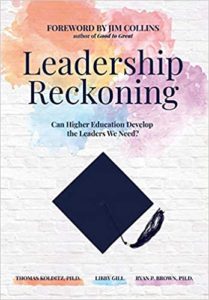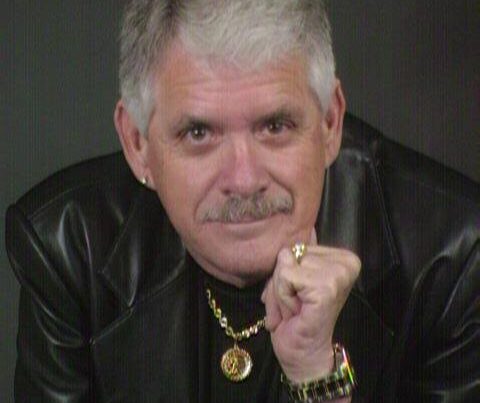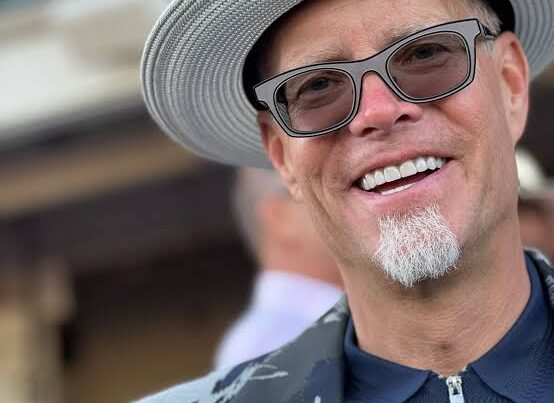Podcast: Play in new window | Download
Subscribe: RSS
Can higher education develop the leaders we want and need?

Thomas Kolditz
Thomas A Kolditz, Ph.D. is the founding Director of the Ann and John Doerr Institute for New Leaders at Rice University–the most comprehensive, evidence-based, university-wide leader development program in the world.
The Doerr Institute was recognized in 2019 as the top university leader development program by the Association of Leadership Educators. Prior to Rice, he taught as a Professor in the Practice of Leadership and Management and Director of the Leadership Development Program at the Yale School of Management.
A retired Brigadier General, Tom led the Department of Behavioral Sciences and Leadership at West Point for 12 years. In that role, he was responsible for West Point’s teaching, research, and outreach activities in Management, Leader Development Science, Psychology, and Sociology, and was titled Professor Emeritus after retirement. A highly experienced global leader, General Kolditz has more than 35 years in leadership roles on four continents. Full bio
Tom is the author of the new book, Leadership Reckoning, which takes to task American colleges and universities for their haphazard, incoherent, evidence-free approaches to developing students as leaders and offers a principle-driven, outcome-oriented blueprint for how effective leader development can occur.
What We Discuss With Tom Kolditz
- What lead Tom to get involved in new leader development
- His new book, Leadership Reckoning
- How we’ve been missing the mark in leader development at the university and college level
- What is leader-tainment and how we go beyond it
- Their programs and how they measure leader development effectiveness
- Can anyone be a great leader
- Their mission and relationship with the Carnegie Foundation
Transcript Highlights
What lead you to get involved in new leader development?
I’ve been involved in new leader development for 25 years, even before West Point and Yale. I was at Yale when John Doerr, who is a well-known venture capitalist that put the money under Google, Amazon and other major companies, decided to make a Google-like difference. He and his wife gave a donation to Rice to do two things. First to create what would be viewed as the most comprehensive and effective leader development program at any university in the world, but then to give it all away and make all boats rise.
So that’s what my life has been about for the last 5 years, making those two things come true.
How have we been missing the mark in terms of new leader development?
First we have to ask ourselves, “Where does it make sense for society to develop large scale more and better leaders?” For a number of reasons related to developmental psychology, availability and funding, the very best place is in colleges and universities. Learning to lead comes very natural to them in that environment.
The challenge we have is that colleges and universities, while they frequently argue that part of their mission or vision is to produce leaders for business and society, somehow missed the scientific transformation and all of the advances that happened in industry for leader development.
Consequently, most of their promises have failed. They simply don’t have a strategy, they haven’t put funding behind it, they haven’t brought in experts, and they kind of treat it as an “also ran.”
No successful organization can take a stated goal of their mission and then fail to execute on it. But they are failing and I’m including the top 20 schools in that. Some schools do well at it but for the most part, they’ve missed the boat.
What is leadertainment and how do we go beyond it to create real change in leader development?
In our book, Leadership Reckoning, we talk about leadertainment and 4 fundamental principles that have to be managed if a university, or really any organization, wants to move away from leadertainment and into effective leader development.
- They have to view leader development as a core function of the university or organization.
- They need to pursue leader development using evidence-based strategies; meaning that it has worked somewhere else for someone else and they can prove it. It doesn’t mean using a theory or academic research, it means that it has worked before.
- We strongly believe in using professional people, not partially trained faculty or untrained mentors, or leaders who come in and profess. We hire professional coaches, professional facilitators, and professional leader developers.
- We measure outcomes that are measured independently, objectively, and in our case, ruthlessly. We’ve discovered all kinds of things that appear to work, that are popular in leader development, but that we can’t get any effects from.
How do you measure effectiveness and what do you look for?
If you change a person in such a way that they are headed towards being a better leader, either emotionally, with a skill-set, or cognitively, all of that can be measured through existing psychological variables.
What we did was separate the people who do the training from the people who measure the outcomes. I have a small team of two research psychologists who provide pre-tests and post-tests for anything that we do. They meet with the program directors and ask, “What kind of change are you trying to cause?” They then translate that into the right kind of psychological variables to look for.
We measure things like leader identity, which is the extent to which a person is convinced they are a leader and will subsequently seek out leader roles and exercise their leadership. We measure emotional intelligence and behavioral skills, not only in the individual but in the people around them – asking them if they see the manifestation of these skills.
It’s a really sophisticated process. Students select themselves into the training, and we wait-list a portion of them so we can test the people who self-selected and got the treatment against those who self-selected and didn’t. That way we can make causal statements.
We don’t have a lot of effect from speakers, so we don’t use them for leader development. They are very good for transferring knowledge as in a lecture, but they’re not that great for leader development because there is no application phase.
We found that single-session workshops did not work for us, but when we do a 2-hour workshop with a 2-week application period, and 2 hours at the end – we call that a catalyst module – that creates results.
The impact on society and business…
Our society pays a huge price (because of poor leader development). Universities graduate 2.2 million students a year into the workforce. Business tries to play catch up in their programming when they should be receiving a new young leader who has been developed. Instead they’re getting college-educated people with high school level leadership skills.
There’s a presumption that if a young person does well and gets a 4-year degree, they are somehow inherently better at leading or they’ve been developed in a direction that would make them a better leader. The data does not support that.
Are there certain groups of students that tend to be more interested in your leader development program?
When we started, we made our 17 different programs available to every student in the university – graduate and under-graduate, but we held back a bit on the business school. We wanted to see what would happen from the other schools. What we found was that there was robust interest. We got more than 35% of the student body engaged – graduate and under-graduate – without the business school.
More recently, we’ve opened the aperture a bit and the business students have come enthusiastically, but we are on track to have 40% of the Rice student body across all 7 schools.
Tell us about the 17 programs you offer and to what extent students get to work with a professional coach?
The first thing people think about when they think of professional one-on-one coaching is that it is expensive, and it can be. So when we built this program, we asked ourselves what was the least expensive way that we could deliver the highest quality coaching. For sure, it was hiring vendors – certified ICF coaches from the Houston business community on an hourly basis.
It is unaffordable to train faculty members to be professional coaches, because you’re paying them fringe, and they’re splitting their time between research, etc. It is also not economical to hire internal coaches and then have them try to coach large numbers of students. So we hire vendors, and while we don’t pay them executive rates, we give them a lot of clients. (It creates a great base of clients for them.)
We can coach 400 students per semester for the equivalent cost of one senior faculty salary plus fringe. We coach for less than $1,000 a student for a whole semester. No professor or even team of professors impacts 400 students in a measurable way, given the time investment of 4-5 sessions over a semester.
We give a coach the first time to every student who asks for one. Usually that is about 800-850 students a year for us. But we have 17 other programs that they can make better use of, than just coaching, coaching, coaching.
Can anyone be a great leader?
Yes I think anyone who wants to, can be a great leader. The majority of leader development or leader capacity is learned. The parts that are not learned that we know are genetic are things like intelligence and good looks, which are things that we’re not going to change and which are things that most of our students bring to the table anyway. Rice students are smart. We add the learned component, which is about 70% of a person’s capacity to lead.
The benefit to the university…
The university is getting all kinds of benefits. We’ve done an extensive ROI study. Because of our programming, between 90 and 120 fewer students are going to the counseling center. Students that go through our programs compared to their peers give more money to the university after they graduate. And their starting salary is about $10,000 more.
Black, Latinx and Native American students who go through our programming retain at a 10% higher rate in the university than their peers. These are all big things for a university, and they often have various diversity programs or alumni programs that actually get less effect than our leader development programming does.
We see decreases in psychological stress, increases in sense of purpose and life satisfaction. We were a hedge against that during COVID. We were a lifeline for students and consequently we had 20% more students in 2020 than we did the year before.
What motivated John Doerr to invest in this initiative?
This all started when John Doerr came to Rice to give a graduation address. At his request they put him with 25 students to talk in a small room, and hand-picked these brilliant students from Rice. At the conclusion, he made it clear that these students were really brilliant but he didn’t think any of them exhibited what he called “leader DNA.”
As a venture capitalist, that’s really important to him because he’s building companies. It’s not enough to be brilliant and have a great idea. You have to have the wherewithal to launch a company. Frequently, he will have a head-hunter find a CEO, COO and CFO and they will build a company around somebody with a good idea because they themselves are incapable of leading sufficiently to run that company. That is part of what we’re trying to make sure doesn’t happen with Rice students.
What is the overall mission for your leader development program over the next 3-5-10 years?
We’ve developed a relationship with the Carnegie Foundation For the Advancement of Teaching. Carnegie is best-known for categorizing all the universities in the U.S., Canada and Australia. People may have heard of a R1 research university. That is a Carnegie classification. With help from Carnegie, we have produced an optional classification for universities to seek, in leadership, education and development, called Leadership For Public Purpose.
We will launch that in the fall (2021) and manage that on behalf of Carnegie to all 4500 colleges and universities in the U.S., Canada and Australia, so that universities that do take leader development seriously get recognized for that. It’s going to be surprising to people how many small and otherwise not well-known schools do this really well. Many of these schools are doing a better job than the top 10 schools in the United States (in terms of leader development).
In working with Carnegie, we think we can make a pretty big difference in 2-3 years. We think the difference will be more than a half-million new leaders developed in a much more professional and better way, and the system being changed so that will perpetuate and grow year after year. That’s how we’re going to fix the paucity of leaders that we currently have going from the universities into the business, government and social sectors.
Episode Resources 
Learn More About The Doerr Institute For New Leaders
Connect With Tom Kolditz
Did You Enjoy The Podcast?
If you enjoyed this episode please let us know! 5-star reviews for the Leaders Of Transformation podcast on Apple Podcasts, Spotify, Pandora or Stitcher are greatly appreciated. This helps us reach more purpose-driven entrepreneurs seeking to make a positive impact in the world. Thank you. Together, we make a difference!
Additional Episodes You May Like
- 361: Alain Hunkins: Cracking The Leadership Code
- 347: Scott Miller: Management Mess to Leadership Success!
- 345: Melissa Lamson: Managing Well in a Complex Business Environment
- 327: Sue Salvemini: Leading From Your Kitchen Table
- 321: Dr. Jeffrey Spahn: The Evolution of Leadership in the Midst Of Crisis
- 297: Craig Wheldon: Life and Leadership Lessons From A 2-Star General










